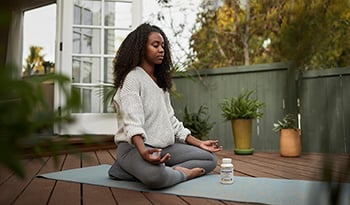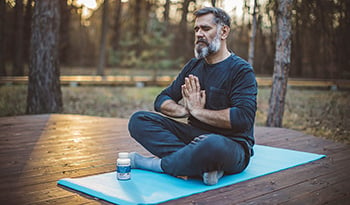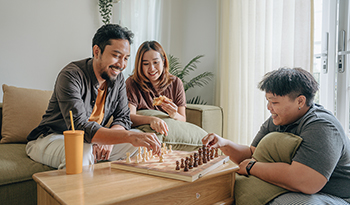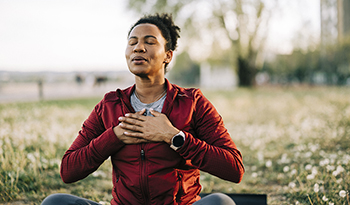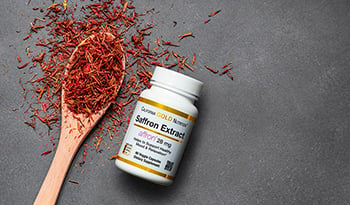4 Natural Herbs for Anxiety Relief
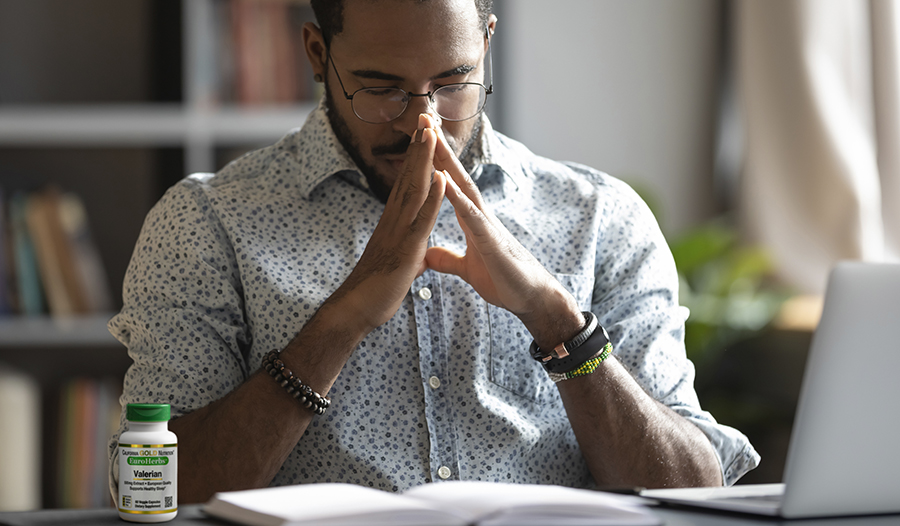
Stress and anxiety problems remain incredibly common. The World Health Organization estimates that around 264 million individuals worldwide suffer from a diagnosable anxiety disorder. Unfortunately, the numbers appear to be growing with a 14.9% increase worldwide between 2005 and 2015.
While different theories exist, worry and anxiety are generally considered to be thought-based problems. When a fearful situation confronts some people, rather than experiencing and processing the fear, they attempt to think of potential solutions in their head.
This internal dialogue helps reduce the acute sense of fear but often blocks its resolution. By having a continuing internal dialogue — worrying about the situation — the fear does not get fully processed and lingers on. Over time, this worry-based approach to stress causes an anxious person to think repeatedly about the future and stressful events that may or may not ever come to pass.
It appears likely that early childhood stress and fear sets the stage for increased worry and anxiety as an adult. Any treatment approach for anxiety should attempt to understand and address the underlying thought processes combined with treatments to help relax and calm the mind and body.
Mindfulness
Mindfulness techniques appear to directly help address worry and anxiety over future events. Mindfulness represents a technique with three main components that directly counter anxiety and worry through:
- The intention to be and stay aware
- Observing the present moment, including thoughts, feelings, and sensations
- A curious, kind, non-judgemental approach to yourself and your awareness
Through exercises focused on staying present and accepting current situations, mindfulness can help decrease worry and anxiety. Mindfulness meditation exercises can often be a part of a comprehensive approach to stress and anxiety management.
Anxiety and Nutrient Deficiencies
While anxiety often gets attributed only to problematic thought patterns, other biochemical factors are easily overlooked. In fact, suboptimal nutrition has been implicated in aspects of both depression and anxiety.
Nutrients relevant to anxiety include:
- Magnesium
- Zinc
- Iron
- Lysine and arginine
Magnesium
Magnesium represents an anti-inflammatory mineral that plays a key role in over 300 different enzyme systems throughout the body. Unfortunately, magnesium deficiencies remain incredibly common, especially in older populations. Further compounding the problem, magnesium deficiencies remain difficult to detect, since the most common test —serum magnesium — is often ineffective. Magnesium is primarily found inside cells, and blood levels don’t necessarily reflect a person’s current magnesium status.
Magnesium levels correlate with anxiety states. I’ve often described magnesium as a relaxation mineral since it is required for muscle relaxation. Stress also seems to increase the need for the mineral. Unfortunately, the current quality of evidence remains low, but overall, the published research suggests that supplemental magnesium helps decrease anxiety levels and stress.
Zinc
Zinc is a vital nutrient that plays a role in numerous processes throughout the body, including immune function. And like magnesium, zinc is also found to be commonly deficient. Some estimates suggest that almost half the world’s population remains at risk for zinc deficiency. Similar to magnesium, standard serum tests of zinc are also not effective for identifying all cases of deficiency.
Poor zinc status has been linked to both depression and anxiety. And research has shown that supplemental zinc in animals helps decrease anxiety. In a study on children, serum zinc levels increased through supplementation correlated with improvements in anxiety and depression. Although the research on zinc and depression is stronger, the available research still suggests that zinc may help reduce anxiety.
Iron
Iron represents a key mineral for energy production throughout the body. Hemoglobin, an iron-containing protein, carries oxygen to cells to produce energy. When deficient, symptoms of low energy and depression are common. However, iron also appears to play a less well-known role in anxiety. Children with a history of iron deficiency struggle with more behavioral problems later in life, including depression and anxiety. A study in adults found that iron deficiency increased risks for psychiatric disorders, including anxiety by one-and-a-half times. Researchers also found that treating these iron deficiencies reduced the incidence of mental health problems.
Iron deficiency remains incredibly common and often undiagnosed. Around 2% of adult men and between 10 and 20% of adult women have a deficiency of the mineral. If you suspect a deficiency, you need testing before supplementation, since both too little and too much iron remain problematic.
Lysine and Arginine
Amino acids are the building blocks of proteins and can play functional roles in different enzyme systems throughout the body. Lysine and arginine are both “essential” amino acids, meaning that we have to consume them through our diet. Lysine appears to have direct effects on reducing anxiety by influencing inhibitory neurotransmitter systems throughout the brain.
Arginine’s effects are a little less direct. Nitric oxide is a signaling molecule produced from arginine. While often associated with blood pressure, nitric oxide also plays a role in regulating stress hormone responses. Arginine's effects on stress hormones may be why it helps with anxiety and stress.
Initial studies in animals have shown decreased anxiety and stress hormones in stressful situations with lysine and arginine. In humans with low lysine, supplementing the amino acid reduces anxiety. A small study in humans with high anxiety showed improved stress responses with supplementation of lysine and arginine. A larger study in Japan showed efficacy in reducing mental stress and anxiety with a combination of amino acids.
4 Natural Herbs For Anxiety
Several natural herbs have also been shown to have benefits for reducing anxiety.
Passion Flower
Passionflower represents an herb with a long history of safe use for helping with stress and anxiety. And more recently, the research supports these effects. Many of the latest clinical trials compared passionflower to standard medications for acute anxiety related to surgical or dental procedures. Generally, passionflower worked as well as medication. An earlier clinical study used passionflower for treating generalized anxiety and also found the herb to be effective.
Ashwagandha
Ashwagandha is a revered herb from ayurvedic medicine. Generally considered a tonic for improving vitality, ashwagandha also shows potential for mental health conditions. A recent trial of ashwagandha with standard medication for generalized anxiety disorder found the combination treatment to be safe and effective for improving anxiety better than medication alone. Other clinical trials have also reported success in reducing anxiety and stress with ashwagandha, likely through its effects on reducing stress hormones.
A recent study even evaluated the effects of ashwagandha on patients struggling with schizophrenia and found significant improvements in their anxiety and depression. Ashwagandha also may increase thyroid function, an advantage in patients struggling with both anxiety and fatigue combined.
Ginkgo biloba
Ginkgo is a tree from Asia often described as a living fossil since trees related to modern varieties grew over 250 million years ago. While generally considered a tonic for improving memory, recent research has also started to uncover other mental health benefits. In older patients suffering from cognitive decline, ginkgo was shown to improve cognitive performance and anxiety. A separate study on dementia patients also found benefits for cognition, anxiety, irritability, depression, and sleep.
Yet, benefits seem to extend beyond elderly patients with cognitive problems. Exploring potential benefits for anxiety in general, a trial on over 100 younger patients with anxiety disorders also found significant benefits with ginkgo. The extract is typically well-tolerated.
Valerian
Valerian root has an unmistakably bad smell, reminiscent of sweaty gym socks. And while the herb smells bad, it may have some potential for helping anxiety. Admittedly, the studies remain somewhat mixed, although clinical trials have shown benefits for treating depression and anxiety when combined with St. John’s wort. Similar to passionflower, it has also been shown to help with anxiety around medical procedures.
The herb appears to be safe and well-tolerated, although a couple of extremely rare cases of liver toxicity have been associated with its use. Considering the popularity of the herb, if it does have liver risks associated with it, they are quite rare. Due to an overabundance of caution, I don’t use valerian in patients with liver disease.
Takeaway
Anxiety and stress remain common and often cause significant challenges for people in their day-to-day lives. Based on the latest research, implementing mindfulness practices, treating nutritional deficiencies, and using herbal treatments may be a feasible approach to help reduce and treat anxiety conditions.
References:
- Depression and Other Common Mental Disorders: Global Health Estimates. Geneva: World Health Organization; 2017. Licence: CC BY-NC-SA 3.0 IGO.
- Behar E, DiMarco ID, Hekler EB, Mohlman J, Staples AM. Current theoretical models of generalized anxiety disorder (GAD): conceptual review and treatment implications. J Anxiety Disord. 2009;23(8):1011-1023. doi:10.1016/j.janxdis.2009.07.006
- Woodruff SC, Arnkoff DB, Glass CR, Hindman RK. Chapter 37: Mindfulness and Anxiety. In: Ngnoumen CT, Langer EJ. The Wiley Blackwell Handbook of Mindfulness. A ed. 2014. doi.org/10.1002/9781118294895.ch37
- Kris-Etherton PM, Petersen KS, Hibbeln JR, et al. Nutrition and behavioral health disorders: depression and anxiety. Nutr Rev. 2021;79(3):247-260. doi:10.1093/nutrit/nuaa025
- Ismail A, Ismail AAA, Ismail Y. Reply: Chronic magnesium deficiency and human disease; time for reappraisal?. QJM. 2019;112(6):475. doi:10.1093/qjmed/hcy298
- Boyle NB, Lawton C, Dye L. The Effects of Magnesium Supplementation on Subjective Anxiety and Stress-A Systematic Review. Nutrients. 2017;9(5):429. Published 2017 Apr 26. doi:10.3390/nu9050429
- Brown KH, Wuehler SE, Peerson JM. The Importance of Zinc in Human Nutrition and Estimation of the Global Prevalence of Zinc Deficiency. Food and Nutrition Bulletin. 2001;22(2):113-125. doi:10.1177/156482650102200201
- Wood RJ. Assessment of Marginal Zinc Status in Humans, The Journal of Nutrition, 2000;130(5):1350S–1354S. https://doi.org/10.1093/jn/130.5.1350S
- Młyniec K, Gaweł M, Doboszewska U, Starowicz G, Nowak G. The Role of Elements in Anxiety. Vitam Horm. 2017;103:295-326. doi:10.1016/bs.vh.2016.09.002
- DiGirolamo AM, Ramirez-Zea M, Wang M, et al. Randomized trial of the effect of zinc supplementation on the mental health of school-age children in Guatemala. Am J Clin Nutr. 2010;92(5):1241-1250. doi:10.3945/ajcn.2010.29686
- Cope EC, Levenson CW. Role of zinc in the development and treatment of mood disorders. Curr Opin Clin Nutr Metab Care. 2010;13(6):685-689. doi:10.1097/MCO.0b013e32833df61a
- Lozoff B, Jimenez E, Hagen J, Mollen E, Wolf AW. Poorer behavioral and developmental outcome more than 10 years after treatment for iron deficiency in infancy. Pediatrics. 2000;105(4):E51. doi:10.1542/peds.105.4.e51
- Młyniec K, Davies CL, de Agüero Sánchez IG, Pytka K, Budziszewska B, Nowak G. Essential elements in depression and anxiety. Part I. Pharmacol Rep. 2014;66(4):534-544. doi:10.1016/j.pharep.2014.03.001
- Lee HS, Chao HH, Huang WT, Chen SC, Yang HY. Psychiatric disorders risk in patients with iron deficiency anemia and association with iron supplementation medications: a nationwide database analysis. BMC Psychiatry. 2020;20(1):216. Published 2020 May 11. doi:10.1186/s12888-020-02621-0
- Killip S, Bennett JM, Chambers MD. Iron deficiency anemia [published correction appears in Am Fam Physician. 2008 Oct 15;78(8):914]. Am Fam Physician. 2007;75(5):671-678.
- Smriga M, Torii K. Prolonged treatment with L-lysine and L-arginine reduces stress-induced anxiety in an elevated plus maze. Nutr Neurosci. 2003;6(2):125-128. doi:10.1080/1028415031000079685
- Srinongkote S, Smriga M, Nakagawa K, Toride Y. A diet fortified with L-lysine and L-arginine reduces plasma cortisol and blocks anxiogenic response to transportation in pigs. Nutr Neurosci. 2003;6(5):283-289. doi:10.1080/10284150310001614661
- Jezova D, Makatsori A, Smriga M, Morinaga Y, Duncko R. Subchronic treatment with amino acid mixture of L-lysine and L-arginine modifies neuroendocrine activation during psychosocial stress in subjects with high trait anxiety. Nutr Neurosci. 2005;8(3):155-160. doi:10.1080/10284150500162937
- Smriga M, Ando T, Akutsu M, Furukawa Y, Miwa K, Morinaga Y. Oral treatment with L-lysine and L-arginine reduces anxiety and basal cortisol levels in healthy humans. Biomed Res. 2007;28(2):85-90. doi:10.2220/biomedres.28.85
- da Cunha RS, Amorim KS, Gercina AC, et al. Herbal medicines as anxiolytics prior to third molar surgical extraction. A randomized controlled clinical trial. Clin Oral Investig. 2021;25(3):1579-1586. doi:10.1007/s00784-020-03468-1
- Akhondzadeh S, Naghavi HR, Vazirian M, Shayeganpour A, Rashidi H, Khani M. Passionflower in the treatment of generalized anxiety: a pilot double-blind randomized controlled trial with oxazepam. J Clin Pharm Ther. 2001;26(5):363-367. doi:10.1046/j.1365-2710.2001.00367.x
- Fuladi S, Emami SA, Mohammadpour AH, Karimani A, Manteghi AA, Sahebkar A. Assessment of Withania somnifera root extract efficacy in patients with generalized anxiety disorder: A randomized double-blind placebo-controlled trial [published online ahead of print, 2020 Apr 13]. Curr Clin Pharmacol. 2020;10.2174/1574884715666200413120413. doi:10.2174/1574884715666200413120413
- Lopresti AL, Smith SJ, Malvi H, Kodgule R. An investigation into the stress-relieving and pharmacological actions of an ashwagandha (Withania somnifera) extract: A randomized, double-blind, placebo-controlled study. Medicine (Baltimore). 2019;98(37):e17186. doi:10.1097/MD.0000000000017186
- Gannon JM, Brar J, Rai A, Chengappa KNR. Effects of a standardized extract of Withania somnifera (Ashwagandha) on depression and anxiety symptoms in persons with schizophrenia participating in a randomized, placebo-controlled clinical trial. Ann Clin Psychiatry. 2019;31(2):123-129.
- Sharma AK, Basu I, Singh S. Efficacy and Safety of Ashwagandha Root Extract in Subclinical Hypothyroid Patients: A Double-Blind, Randomized Placebo-Controlled Trial. J Altern Complement Med. 2018;24(3):243-248. doi:10.1089/acm.2017.0183
- Gavrilova SI, Preuss UW, Wong JW, et al. Efficacy and safety of Ginkgo biloba extract EGb 761 in mild cognitive impairment with neuropsychiatric symptoms: a randomized, placebo-controlled, double-blind, multi-center trial. Int J Geriatr Psychiatry. 2014;29(10):1087-1095. doi:10.1002/gps.4103
- Scripnikov A, Khomenko A, Napryeyenko O; GINDEM-NP Study Group. Effects of Ginkgo biloba extract EGb 761 on neuropsychiatric symptoms of dementia: findings from a randomised controlled trial. Wien Med Wochenschr. 2007;157(13-14):295-300. doi:10.1007/s10354-007-0427-5
- Müller D, Pfeil T, von den Driesch V. Treating depression comorbid with anxiety--results of an open, practice-oriented study with St John's wort WS 5572 and valerian extract in high doses. Phytomedicine. 2003;10 Suppl 4:25-30. doi:10.1078/1433-187x-00305
- Farah GJ, Ferreira GZ, Danieletto-Zanna CF, Luppi CR, Jacomacci WP. Assessment of Valeriana officinalis l. (Valerian) for Conscious Sedation of Patients During the Extraction of Impacted Mandibular Third Molars: A Randomized, Split-Mouth, Double-Blind, Crossover Study. J Oral Maxillofac Surg. 2019;77(9):1796.e1-1796.e8. doi:10.1016/j.joms.2019.05.003
- Gharib M, Samani LN, Panah ZE, Naseri M, Bahrani N, Kiani K. The effect of valeric on anxiety severity in women undergoing hysterosalpingography. Glob J Health Sci. 2015;7(3):358-363. Published 2015 Apr 2. doi:10.5539/gjhs.v7n3p358
PENAFIAN:PUSAT KESEHATAN tidak dimaksudkan untuk memberikan diagnosis...
















































































 Daftar Isi
Daftar Isi



